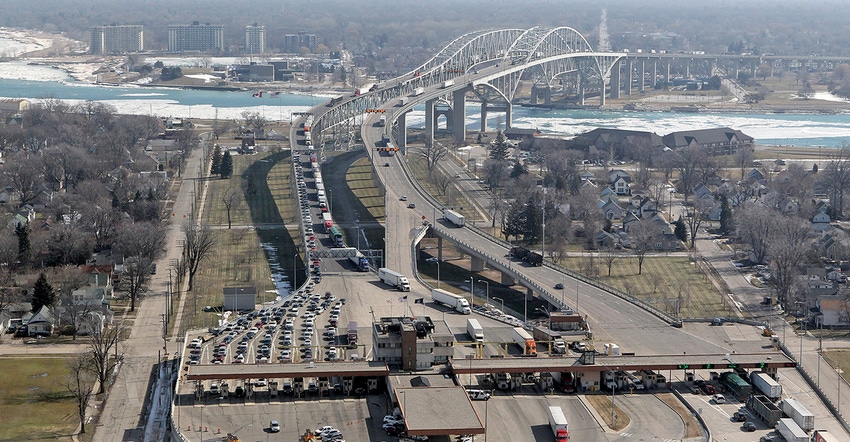February 19, 2020

Legislation to address the shortage of agricultural inspectors at U.S. borders has cleared the House of Representatives, paving the way for the package to be signed into law by President Donald Trump.
U.S. Sen. Gary Peters, D-Mich., a ranking member of the Senate Homeland Security and Governmental Affairs Committee, introduced the legislation with U.S. Sens. Pat Roberts, R-Kan., Debbie Stabenow, D-Mich., and John Cornyn, R-Texas. U.S. Rep. Filemon Vela Jr., D-Texas, introduced the companion legislation in the House.
Peters said that the Protecting America’s Food & Agriculture Act of 2019 will ensure the safe and secure trade of agricultural goods across our nation’s borders by authorizing U.S. Customs and Border Protection (CBP) to hire additional inspectors, support staff and K-9 teams to fully staff America’s airports, seaports and land ports of entry.
“Our country faces a shortage of agricultural inspectors that could leave our agricultural industry vulnerable to diseases, pests and other threats that could devastate our economy and compromise the health and safety of millions of Americans,” Peters said.
Michigan is home to two of the nation’s busiest border crossings — the Detroit-Windsor crossing and the Blue Water Bridge, Peters said. About 300,000 people and $910 million in trade crosses the northern U.S. border daily, representing the largest bilateral flow of goods and people in the world.
CBP and USDA are tasked with facilitating safe and secure importation of agricultural goods into the U.S. The program’s agricultural specialists and K-9 units conduct inspections of passengers, commercial vessels, trucks, aircraft and railcars at U.S. ports of entry to protect health and safety by preventing the entry of harmful goods and invasive species that may pose a threat to American food and agriculture.
On a typical day, those inspectors process more than 1 million passengers and 78,000 truck, rail and sea containers carrying goods worth about $7.2 billion. According to CBP estimates, there is a shortage of nearly 700 inspectors across the country.
The Protecting America’s Food & Agriculture Act of 2019 authorizes the annual hiring of 240 agricultural specialists a year until the workforce shortage is filled — and 200 agricultural technicians a year to carry out administrative and support functions.
The bill also authorizes the training and assignment of 20 new K-9 teams a year, which have proven valuable in detecting illicit fruits, vegetables and animal products that may have otherwise been missed in initial inspections.
Finally, the bill authorizes supplemental appropriations each year to pay for the activities of the agriculture specialists, technicians and K-9 teams.
In addition to the Michigan Farm Bureau, the legislation was supported by a broad coalition of groups, including the U.S. Chamber of Commerce, American Farm Bureau Federation, Michigan Agri-Business Association, and Michigan Pork Producers Association, said John Kran, MFB national legislative counsel.
“Invasive species like spotted wing drosophila and the brown marmorated stinkbug are just two examples of non-native pests that have created havoc for Michigan farmers over the last few years,” Kran said. “This bill will expand and enhance border inspections and provide farmers with another level of protection from foreign pests that negatively impact both farmers and the consumers they feed.”
Mary Kelpinski, Michigan Pork Producers Association CEO, says the passage of the legislation is essential, noting the outbreak of African swine fever in China and many other countries around the world requires more resources and tighter monitoring.
“Border security professionals must have the resources necessary to carry out this critical mission and protect our nation from contaminated or fraudulent imports,” Kelpinski added. “This common-sense legislation will help ensure our farmers can continue to produce the highest-quality products — without fear that foreign imports will compromise the quality of U.S. goods.”
Source: Michigan Farm Bureau, which is solely responsible for the information provided and is wholly owned by the source. Informa Business Media and all its subsidiaries are not responsible for any of the content contained in this information asset.
You May Also Like




